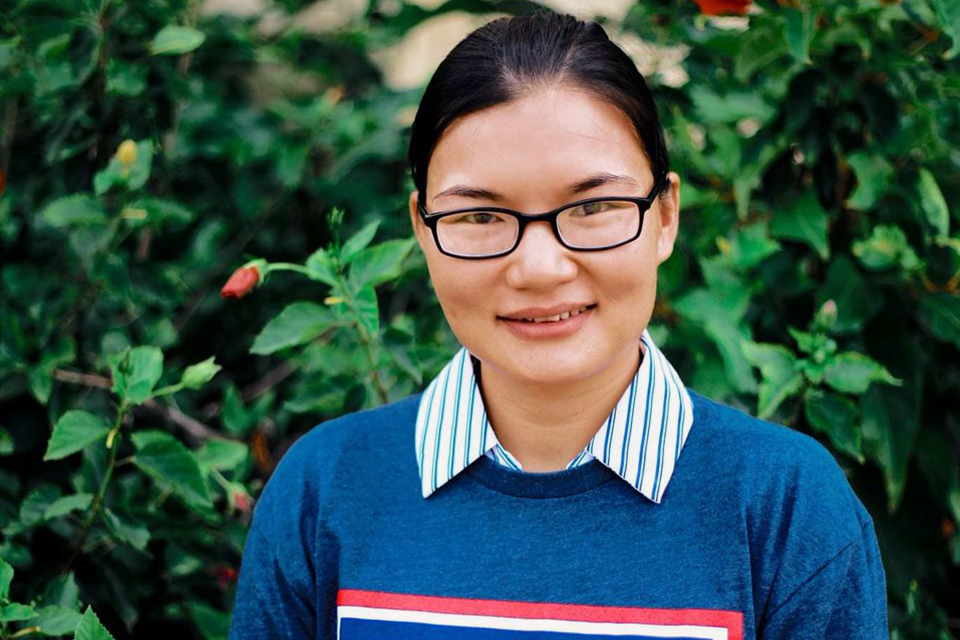From China to the US Military to Brandeis, Esther Lee Learns the Pedagogical Strategies Necessary to be an Effective Educator

May 9, 2021
Carey Slaeker | Graduate School of Arts and Sciences
As an active duty service member in the United States Army, Esther Lee took a non-traditional path to Brandeis. “I [had to] postpone my education to make way for missions many times,” she recalls. However, her service as a linguist in the military helped carve that pathway straight toward the Teaching Chinese MA Program.
Lee’s passion for language started at a young age in her home-country of China. “The place that I grew up in is a melting pot of multiple cultures,” she says. As a result of this exposure, Lee found that “language, as the charm of the culture, is where my passion comes from.” In addition, Lee knows what it is like to struggle with a foreign language. As someone who learned English as a second language in adulthood, Lee knows the struggles of foreign language learners. As a result, Lee’s passion for language combined with her compassion for language learners struggling with a new language. “I would love to share my experience about learning a foreign language and, at the same time, improve my teaching skills so I can help the students better.”
As a linguist in the U.S. Army, Lee found many opportunities to exercise her passion. “I always volunteered to tutor my fellow soldiers,” she says. This led Lee to seek additional training to make herself a more effective educator. During this process, Lee learned of Brandeis’ Teaching Chinese Program which provides instruction in class design, theory, and practice for teaching Chinese. With an effective curriculum and a dynamic and renowned faculty, Lee knew that Brandeis would be her “best chance to fulfill my academic goals.”
As a graduate in the Teaching Chinese Program, Lee is thrilled by the opportunities that the program provides. “Although I was educated in China, I have never had a systematic learning of the Chinese language,” Lee explains. However, through Brandeis’ Teaching Chinese Program, Lee is not only shoring up the scaffolding of her own language learning, but she is also receiving the latest tools of theory and practice in foreign language instruction.
Lee also appreciates the flexibility of the program, which allows her to continue her studies while serving in the military. “[My] professors are very communicative and flexible, and in case I have to leave for a mission, they offer [to let] me make up the hours.” Without this kind of flexibility, Lee would likely have needed to postpone her education once again. However, she appreciates having a supportive faculty who care about seeing her succeed. “In all, I am lucky to have great professors who're helping me to make this work.”
With the skills that she is developing at Brandeis, Lee is looking for opportunities to share them. “I am hoping to expand my knowledge, strengthen professional skills, and help more foreign language learners reach their language goal.” Fortunately, the job offers are already starting to come in. With several companies actively recruiting her as a contract linguist, Lee is excited to see her goals come to fruition. “[Being a] Chinese instructor and linguist is my dream job,” she says. “I will continuously use my linguistic skills and the skills of teaching Chinese in helping other foreign language learners at my job.”
For Lee, her passion is on display when she is engaged in teaching the Chinese language and culture. Lee is grateful for the tools and expertise that Brandeis is providing her. For those who are interested in pursuing an MA in Teaching Chinese, Lee recommends the strategy that worked for her:
“Choose this program if you are passionate about teaching and culture. Make the voluntary commitment to participate in the movement of lifelong learning. It will enhance your personal and professional development, as well as your self-sustainability and employability.”






